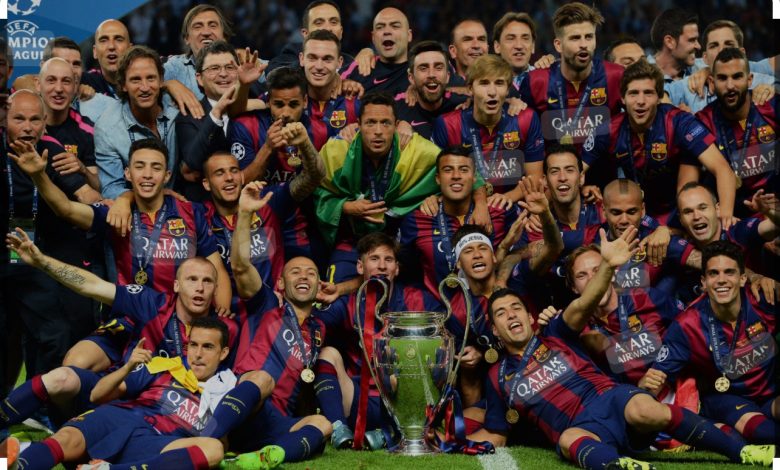FC Barcelona: A Legacy of Football Excellence


Futbol Club Barcelona, more commonly known as Barcelona or simply Barça, is one of the most iconic and successful football clubs in the world. Based in Barcelona, Catalonia, the club is recognized for its unique style of play, immense global fanbase, and rich history. Since its founding in 1899, Barcelona has gone on to establish itself not only as a football giant but also as a symbol of Catalan pride and identity.
The Origins of Barcelona
FC Barcelona was founded on November 29, 1899, by a group of Swiss, Catalan, German, and English footballers led by Joan Gamper, a Swiss entrepreneur. Initially, the club was formed as a way for people to engage in sport, and it began by competing in regional leagues and friendly matches. The club’s first success came quickly as they began to rise in prominence within Spain.
The club’s identity and motto, “Més que un club” (More than a club), reflect its deep connection to the people of Catalonia and their desire to promote their culture and language during a time of political tension. Over the decades, Barcelona has become a symbol of Catalan identity, particularly in the face of challenges like the Spanish Civil War and the Franco regime, which sought to suppress Catalan culture and language.
Footballing Success and Domestic Dominance
FC Barcelona is one of the most decorated clubs in the world, having won numerous La Liga titles, Copa del Rey trophies, and Supercopa de España victories.
• La Liga Titles: Barcelona has won 27 La Liga titles (as of 2024), making them one of the most successful teams in the Spanish league. Their dominance in Spanish football has been defined by high-quality football, filled with legendary players and managers.
• Copa del Rey: Barcelona is also the most successful club in the history of the Copa del Rey, having won the prestigious domestic cup 31 times (as of 2024). Their success in this competition is a testament to their ability to maintain consistency in both league and cup formats.
• Supercopa de España: Barcelona has won the Spanish Super Cup 13 times, further adding to their dominance in Spanish football.
European Glory: UEFA Champions League
Barcelona has had tremendous success in European football, particularly in the UEFA Champions League, where they have secured their place among Europe’s elite.
• UEFA Champions League Titles: FC Barcelona has won the UEFA Champions League 5 times, with their victories coming in 1992, 2006, 2009, 2011, and 2015. Their success in European competitions is one of the pillars of their reputation as one of the top football clubs globally.
Barcelona’s style of play, especially during the Pep Guardiola era, has been praised worldwide for its emphasis on possession, quick passing, and attacking football. This tiki-taka style was pivotal in their 2009 and 2011 UEFA Champions League successes, where Barcelona defeated the likes of Manchester United in the finals, showcasing their dominance on the European stage.
• UEFA Cup Winners’ Cup: In addition to their Champions League victories, Barcelona has also secured the Cup Winners’ Cup on four occasions, further proving their ability to succeed across various European competitions.
Iconic Players of Barcelona
Over the years, FC Barcelona has been home to some of the greatest footballers of all time. The club’s philosophy of nurturing talent and its emphasis on developing players through their famed La Masia youth academy has led to the emergence of world-class stars. Some of the most notable figures in the club’s history include:
• Lionel Messi: Widely regarded as one of the greatest footballers of all time, Lionel Messi spent over 20 years at Barcelona, contributing to the club’s global success. Messi is Barcelona’s all-time top scorer and has won numerous Ballon d’Or awards. His vision, dribbling, and goal-scoring prowess made him the centerpiece of Barcelona’s golden era.
• Johan Cruyff: The legendary Johan Cruyff revolutionized Barcelona both as a player and later as a manager. His tactical innovations laid the foundation for Barcelona’s philosophy of possession-based football, which would go on to define the club’s style of play for decades. Cruyff’s influence on the club was monumental, both on and off the pitch.
• Xavi Hernández and Andrés Iniesta: Two of the most iconic midfielders in football history, Xavi and Iniesta were instrumental in Barcelona’s successes, particularly during the Pep Guardiola era. Their vision, passing, and ability to control the tempo of the game were key to Barcelona’s success in domestic and international competitions.
• Ronaldinho: Ronaldinho brought flair and joy to the football world during his time at Barcelona, winning numerous La Liga and Champions League titles. His magical dribbling, creativity, and skill earned him widespread admiration and helped Barcelona become a dominant force in Europe.
The Barcelona Style: Tiki-Taka and the Guardiola Legacy
One of the defining features of Barcelona’s success over the years is its distinctive style of play, often referred to as “tiki-taka.” This possession-based football style emphasizes quick, short passes, intricate movement, and an overall focus on maintaining control of the game. This style reached its peak under Pep Guardiola, who managed the team from 2008 to 2012.
Under Guardiola’s leadership, Barcelona achieved unprecedented success, winning 14 trophies in four seasons, including the 2009 Champions League and La Liga. Guardiola’s philosophy has continued to influence Barcelona even after his departure, shaping the way they approach matches and develop players through their academy.
The La Masia Academy: Developing Future Stars
One of Barcelona’s most significant achievements has been its commitment to developing young talent. The club’s La Masia academy has produced some of the best footballers in the world, with Lionel Messi, Xavi, Iniesta, and Sergio Busquets among the most notable graduates. The academy’s emphasis on technique, tactical awareness, and the Barcelona playing style has produced numerous players who have made significant contributions to the first team.
La Masia’s importance goes beyond producing just footballers; it represents the club’s broader philosophy of nurturing young talent and promoting a sense of unity and club loyalty. This focus on developing talent from within has played a key role in Barcelona’s sustained success over the years.
The Camp Nou: A Home of Champions
Camp Nou, the home stadium of FC Barcelona, is one of the largest and most famous football stadiums in the world. With a capacity of over 99,000 spectators, it is a fortress for the club and one of the most iconic stadiums in world football. Camp Nou has witnessed countless historic moments, from dramatic comebacks in the Champions League to unforgettable victories in El Clásico matches against Real Madrid.
The stadium is more than just a sporting venue; it is a symbol of the club’s history, achievements, and the passionate fans who support it.
Recent Challenges and the Road Ahead
In recent years, FC Barcelona has faced a period of transition, marked by financial struggles, changes in management, and the departure of club legend Lionel Messi in 2021. Despite these challenges, the club remains one of the most influential in world football. With a new generation of players and a renewed focus on youth development, Barcelona is looking to return to its former glory.
Conclusion
FC Barcelona is a club that stands for excellence, passion, and tradition. From its roots in 1899 to its place as one of the most successful and beloved football clubs in the world today, Barcelona has left an indelible mark on the sport. With a rich history of trophies, legendary players, and a unique style of play, Barcelona’s legacy will continue to inspire generations of fans around the globe. As they navigate the challenges of modern football, Barcelona’s commitment to their core values promises to keep them at the forefront of global football for many years to come.
Read also Galatasaray S.K.: A Rich Legacy of Success, Passion, and Dominance in Turkish Football

